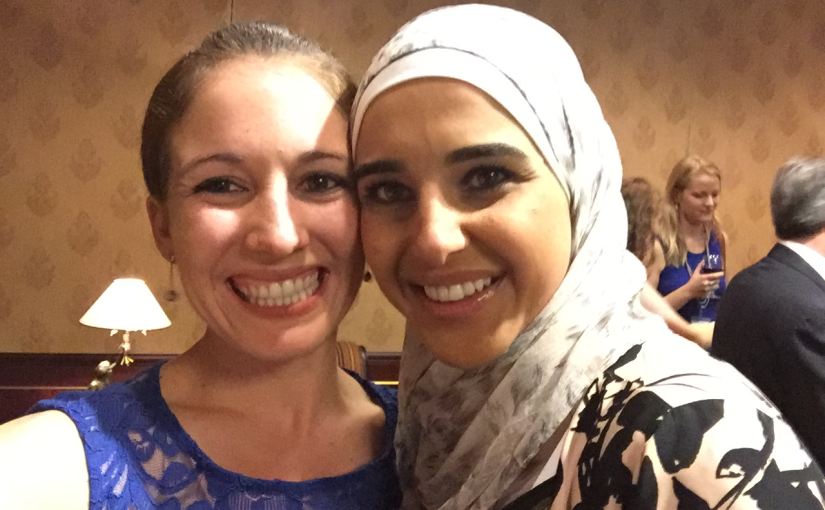Heads turn as she walks into the dry cleaning store and makes her way to the end of the line, her face impassive. Black, gauzy fabric outlines her face, mirroring black eyeliner surrounding defiant eyes. Whispers start down the line. A child openly stares at her until his mother pulls him closer, breaking his gaze. No one says out loud what my gut tells me what they might be thinking.
Fifteen years after 9/11 and in the midst of an election cycle where one of the leading presidential candidates proposes to ban Muslims from entering the United States, wearing a hijab, for some, still means something other than religious devotion. I say this because I used to feel that way.
The first major news event I can remember is 9/11. It was the day my entire 7th grade class stared uncomprehendingly at the TV, watching planes crash into the Twin Towers, leaving in their trail a new era of fear and animosity towards the Muslim and Arab world. With less than two percent of Americans identifying as Muslim, many Americans go through life without any Muslim friends to help parse through the stereotypes. I was one of them.
It wasn’t until I graduated college that my worldview shifted and I started waking up with the call to prayer.
In Niger, where I served as a Peace Corps Volunteer, Islam wasn’t just a religion; it was the very fabric of everyday life. I saw the generosity embedded within my neighbor’s religiosity. Despite living off of less than USD $2 a day, my neighbors regularly gave zakaat, or charitable donations, to anyone in need. I saw a devotion beyond anything I’d ever experienced, a devotion steady enough to bow down and pray five times a day. A devotion strong enough to cease all eating and drinking during the daytime for the entire month of Ramadan, the desert heat notwithstanding. And a devotion to community and kinship that left me with longing once I’d returned back to my American world of iPhones and Instagram.
I returned to the United States with a yearning to learn more about other cultures and ways of life, which not only enriched my life, but to my surprise, helped me to learn more about myself and the contribution I wanted to make to society.
Because of my experience in Niger, I wanted to explore feminism in an Islamic context and what that would mean for women’s empowerment. As I observed, many of the Nigerien women I loved had very little power within their society. As is the case in so many rural villages where opportunities for women are limited, the man was the head of the household and had the final say in everything, from whether his girl children attended school, to whom they married. Husbands could restrict their wives’ travel and who they interact with. Yet despite their limited opportunities, these incredibly strong, powerful Nigerien women encouraged me to pursue an entrepreneurial path. Their encouragement ultimately led to me to start a food company, Kuli Kuli, based on my Peace Corps experience.
A few months ago, I was offered a once-in-a-lifetime opportunity to travel to Jordan to participate in the Open Hands Initiative’s Fellowship for Young Women Entrepreneurs. I traveled with ten American entrepreneurs to Amman where we met ten fellow Jordanian young women entrepreneurs. We spent a week together learning and collaborating. We dressed differently, spoke different languages, and prayed to different gods (if we prayed at all). But the differences, in my mind, were trivial compared to how similar we were. We were all navigating starting businesses while balancing family and society’s limited expectations of us, which did not include being entrepreneurs.
I was amazed by how shockingly similar our life experiences were. All of us had experienced sexism in one form or another. All of us had found men who appreciated and supported our work. And despite my preconceived notion of the hurdles that a woman in a Muslim society would face, the women wearing hijabs were just as outspoken, assertive, and determined as any of the Americans in their good ol’ blue jeans.
One of my new Jordanian friends Malak Al Akiely finally explained the hijab to me in a way that I could understand. “It’s like my hair,” she said,” I change it depending on what I’m wearing and it feels as natural as changing my hairstyle”. When I commented that her incredible sense of style and that the color coordination between her clothing and her headscarf almost made me want a hijab, Malak laughed. She told me that was part of her plan of challenging misconceptions of Muslim women. “I want to prove that a woman wearing a hijab can be beautiful,” she said.
Malak’s words come to mind across the Atlantic to a January’s day where I’m standing in the dry cleaning shop, ready to leave. I take my stuff, pause in front of the woman waiting at the end of the line. “Nice hijab,” I tell her, smiling. Her face registers shock, just before her lips curve upward into a small smile.
The views expressed in this post are those of the author and do not necessarily reflect the views or opinions of the Open Hands Initiative.
About the Author: Lisa Curtis is the Founder and CEO of Kuli Kuli, a food company working with women-led farming cooperatives from around the world to drive economic growth, women’s empowerment, and sustainable agricultural development. Lisa was one of 20 female entrepreneurs from the United States and Jordan who participated in our Fellowship for Young Women Entrepreneurs, a cross-culture exchange connecting bright business minds to increase global prosperity and develop pathways for international dialogue.
